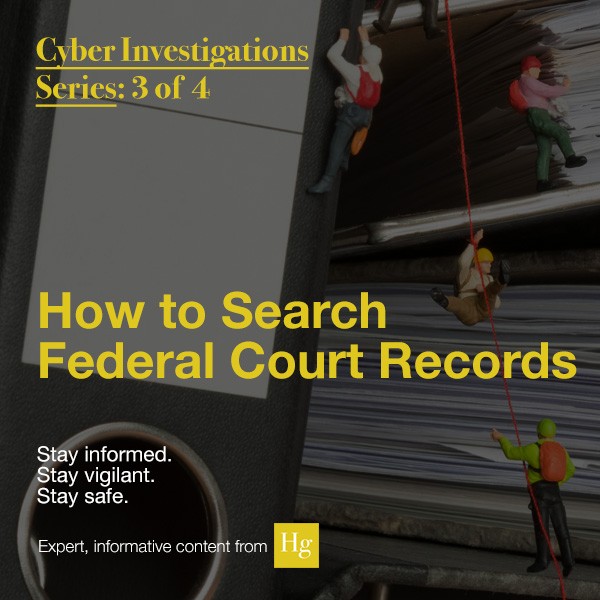By Cynthia Hetherington
 Inevitably, investigations will always come down to legal and regulatory violations or sanctions, whether a foreign government or a sex offender list. In this 4-part blog series, we examine the various investigative trails that develop because of involvement with, or violation of, government regulatory issues. These trails of so-called dirt are grouped into six categories:
Inevitably, investigations will always come down to legal and regulatory violations or sanctions, whether a foreign government or a sex offender list. In this 4-part blog series, we examine the various investigative trails that develop because of involvement with, or violation of, government regulatory issues. These trails of so-called dirt are grouped into six categories:
Local, State, and Federal Court Records
Licensing Boards and Disciplinary Actions
Trails of Financial Crimes
Publicly Traded Companies and Security Dealers Compliance Actions
Government Watch Lists
Sanctions, Terrorists, and Other Law Enforcement Sources
When companies and/or people are found on regulatory lists, it does not necessarily mean they are suspected of crimes or should be avoided completely. Instead, the circumstances should be examined and understood—especially in the cases of very large companies. For example, one section of a company might be responsible for a seemingly egregious error, but, in reality, is merely a minor issue meriting a fine and a wrist-slap. In comparison, an ethics violation in the sports world, appearing to have been covered up, might result in, say, a penalty filed against one NFL player, which subsequently is then captured by the media and results in a lifetime suspension of that player and a call to remove the NFL Commissioner, with sweeping regulatory changes to follow.
Last week we reviewed state and vendor records. This week we explore federal court records.
Federal Court Records
At the federal level, all cases involve federal or U.S. constitutional law or interstate commerce. Records of criminal acts that violate federal law are found at the 290 U.S. District Courts. The task of locating the right court is seemingly simplified by the nature of the federal system:
- All court locations are based upon the plaintiff’s county of domicile
- All civil and criminal cases go to the U.S. District Courts
- All bankruptcy cases go to the U.S. Bankruptcy Courts
Numerous programs have been developed for electronic access to federal court records. Over the years, the Administrative Office of the United States Courts in Washington, D.C. has developed three innovative public access programs: VCIS, PACER, and most recently the Case Management/Electronic Case Files (CM/ECF) project.
The most useful program for online searching is now CM/ECF. VCIS access is via telephone and it is being phased out; PACER via Internet or remote dial-up is being replaced by CM/ECF.
Case Management/Electronic Case Files (CM/ECF)
CM/ECF is the case management system for the Federal Judiciary for all bankruptcy, district, and appellate courts. CM/ECF allows courts to accept filings and provide access to filed documents over the Internet. CM/CDF replaced aging electronic docketing and case management systems in all federal courts in 2005. It is important to note that when you search ECF, you may be ONLY searching cases that have been filed electronically. A case may not have been filed electronically through CM/ECF, so you must still conduct a search using PACER if you want to cover all your bases when searching to find if a case exists.
The website to sign up for CM/ECF access is www.pacer.psc.uscourts.gov/cmecf/ index.html. Note that most courts offer tutorials on how to use CM/ECF.
PACER
PACER, the acronym for Public Access to Electronic Court Records, provides docket information online for open cases at all U.S. Bankruptcy courts and most U.S. District courts. Currently most courts are available on the Internet. Cases for the U.S. Court of Federal Claims are also available.
A problem with PACER is that each court determines when records will be purged and how records will be indexed, leaving you to guess how a name is spelled or abbreviated and how much information about closed cases your search will uncover. A PACER search for anything but open cases cannot take the place of a full, seven-year search of the federal court records available by written request from the court itself or through a local document retrieval company. Many districts report that they have closed records back a number of years, but at the same time indicate they purge docket items every six months.
View an excellent FAQ on PACER here.
A lack of identifiers can be a problem when searching any federal court records. Most federal courts do not show the full DOB or Social Security number on records available to the public. Thus, if a record searcher has a common name and gets one or more hits, each individual case file may need to be reviewed to determine if the case belongs to the subject in mind.
Other Federal Record sources include the Federal Bureau of Prisons and the National Wants & Warrants.
These resources will give you a solid start in your searching the courts, sanctions, regulatory actions, and other violations of the law.

Are you an analyst or investigator looking for advanced #OSINT training ? If so, check out Hg’s webinar series, where you can attend live sessions and receive CEUs or watch previously recorded sessions to beef up your investigative skills.

Are you interested in working with an international company but unsure if it’s legitimate? As veteran investigators in cyber investigations, Hg understands the business world and the legal and regulatory frameworks in which corporations and privately held companies operate. Our skilled analysts excel at exposing financial risks, reputational issues, criminal activity, and legal actions detrimental to your personal and business stability. Learn how our team can arm you with the data you need.
 Cynthia Hetherington, MLS, MSM, CFE, CII is the founder and president of Hetherington Group, a consulting, publishing, and training firm that leads in due diligence, corporate intelligence, and cyber investigations by keeping pace with the latest security threats and assessments. She has authored three books on how to conduct investigations, is the publisher of the newsletter, Data2know: Internet and Online Intelligence, and annually trains thousands of investigators, security professionals, attorneys, accountants, auditors, military intelligence professionals, and federal, state, and local agencies on best practices in the public and private sectors.
Cynthia Hetherington, MLS, MSM, CFE, CII is the founder and president of Hetherington Group, a consulting, publishing, and training firm that leads in due diligence, corporate intelligence, and cyber investigations by keeping pace with the latest security threats and assessments. She has authored three books on how to conduct investigations, is the publisher of the newsletter, Data2know: Internet and Online Intelligence, and annually trains thousands of investigators, security professionals, attorneys, accountants, auditors, military intelligence professionals, and federal, state, and local agencies on best practices in the public and private sectors.



